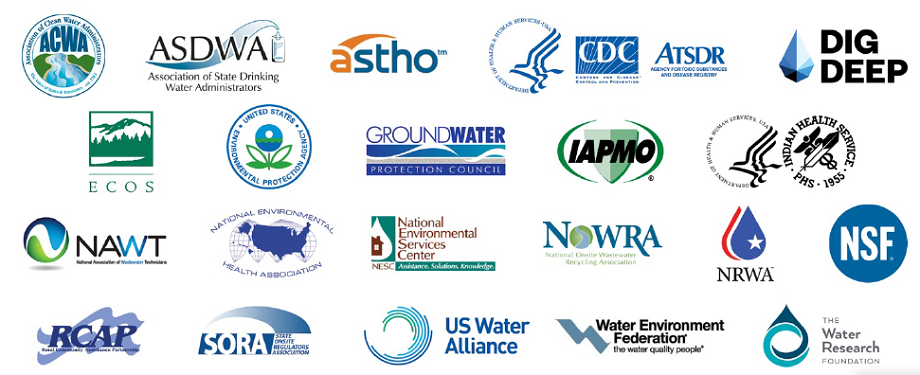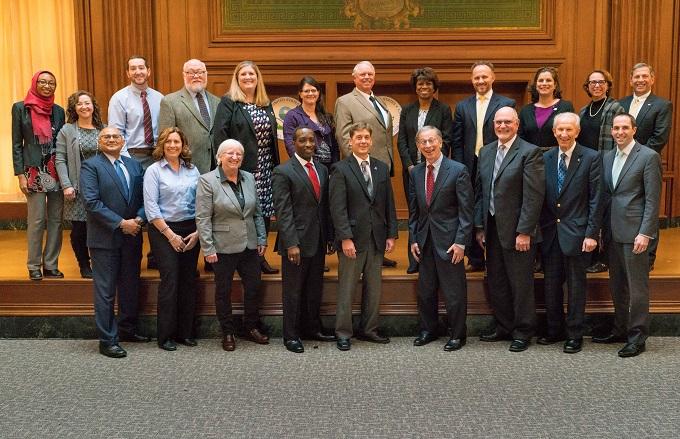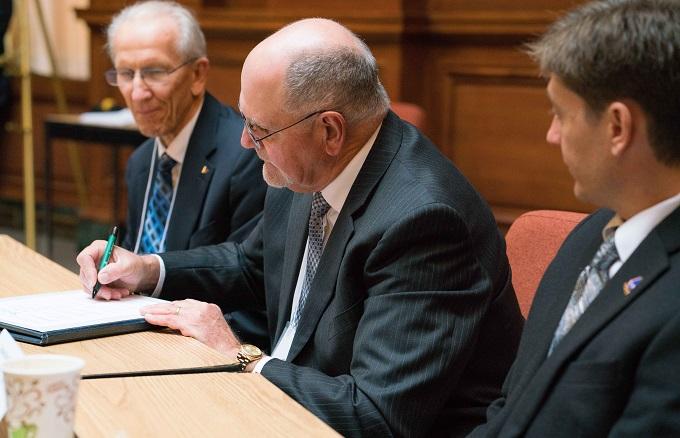Decentralized System Partners
EPA's Decentralized Wastewater Management Memorandum of Understanding (MOU) Partnership
EPA and 20 partner organizations are joined by an MOU to work collaboratively at the national level to improve decentralized performance and protect the nation's public health and water resources. EPA initiated this MOU partnership in 2005 through an MOU with eight public and private sector organizations. The MOU has expanded over the 15 years, comprised of 20 partners as of September 23, 2020.

2020 Decentralized Wastewater Management MOU
The 2020 MOU renewed the commitment of EPA and its partner organizations to work together to encourage proper management of decentralized systems and increase collaboration among EPA, state and local governments, and decentralized system practitioners and providers.
2020 MOU Signing Event
At the MOU signing event, 20 public and private sector organizations expressed their intent to work together to improve management of decentralized wastewater. (Note, due to the 2020 MOU Partnership renewal meeting being a “virtual” event, the image shared below is from the 2017 renewal meeting.)
 Decentralized MOU Participants, November 14, 2017 (photo credit: Eric Vance, U.S. EPA)
Decentralized MOU Participants, November 14, 2017 (photo credit: Eric Vance, U.S. EPA)
Top Row (left to right): Gaida Mahgoub (U.S. EPA, ORISE), Heidi Faller (U.S. EPA), Zach Lowenstein (U.S. EPA), Tim Williams (WEF), Alexandra Dunn (ECOS), Deirdre Mason (ASDWA), Gene Bassett (NAWT), Dr. Sharunda Buchanan (CDC/ NCEH), Dain Hansen (IAPMO), Julia Anastasio (ACWA), Sandra Whitehead (NEHA), James Blumenstock (ASTHO)
Bottom Row (left to right): Dr. Amit Pramanik (WE&RF), Sharon Steiner (NSF), Mary Clark (SORA), Dr. Andrew Sawyers (U.S. EPA), Matt Holmes (NRWA), Michael Shapiro (U.S. EPA), Jim Bell (NOWRA), Dr. Richard Bajura (NESC), Nathan Ohle (RCAP)
 Jim Bell (NOWRA President) signs the Decentralized MOU Agreement, November 14, 2017 (photo credit: Eric Vance, U.S. EPA)
Jim Bell (NOWRA President) signs the Decentralized MOU Agreement, November 14, 2017 (photo credit: Eric Vance, U.S. EPA)
2017-2020 Accomplishments of the EPA Decentralized Wastewater MOU Partnership
The 2017 – 2020 Accomplishments Report highlights key accomplishments for the MOU renewal period 2017-2020. The information has been provided by members of the EPA Decentralized Wastewater MOU Partnership. The document focuses on the MOU Partnership’s priorities to:
- work with state and local government entities on outreach to homeowners with septic systems, such as the annual homeowner awareness campaign, SepticSmart Week;
- obtain accurate decentralized system data nationally;
- emphasize the growing decentralized system technologies;
- leverage financial mechanisms for homeowners with septic systems; and
- promote education and training for the decentralized workforce.
Papers by the Decentralized Wastewater Management MOU Partnership
View four position papers prepared by the MOU Partnership for state, local, and tribal government officials, and interested stakeholders. These materials include information on the uses and benefits of decentralized wastewater treatment and examples of where it has played an effective role in a community's wastewater treatment infrastructure.
- Introduction to Decentralized Wastewater Treatment: A Sensible Solution
- Decentralized Wastewater Treatment Can Be Cost Effective and Economical
- Decentralized Wastewater Treatment Can Be Green and Sustainable
- Decentralized Wastewater Treatment Can Protect the Environment, Public Health, and Water Quality
Fact Sheets by the Decentralized Wastewater MOU Partnership
- Distributed Systems Overview Fact Sheet (PDF)(4 pp, 159 K, About PDF)Exit
Joint WEF/WRF/Decentralized MOU Partnership fact sheet provides an overview of decentralized/distributed systems in both rural and urban communities, as well as examples in different geographic regions.
Webcasts by the Decentralized Wastewater Management MOU Partnership
- View webcasts sponsored by the MOU Partnership. Since October 2010, the EPA Decentralized MOU Partnership has sponsored a series of webcasts discussing issues of interest to the decentralized community.
Additional Affiliates to the Decentralized Program
Provides information for county officials, including legislative affairs, projects and programs, and conferences and events.
Offers tools and programs for local health officials on various issues. It also offers an up-to-date review of public advocacy issues and a comprehensive bookstore.
The Water Program section of this website has information on grant programs and informative pamphlets.
